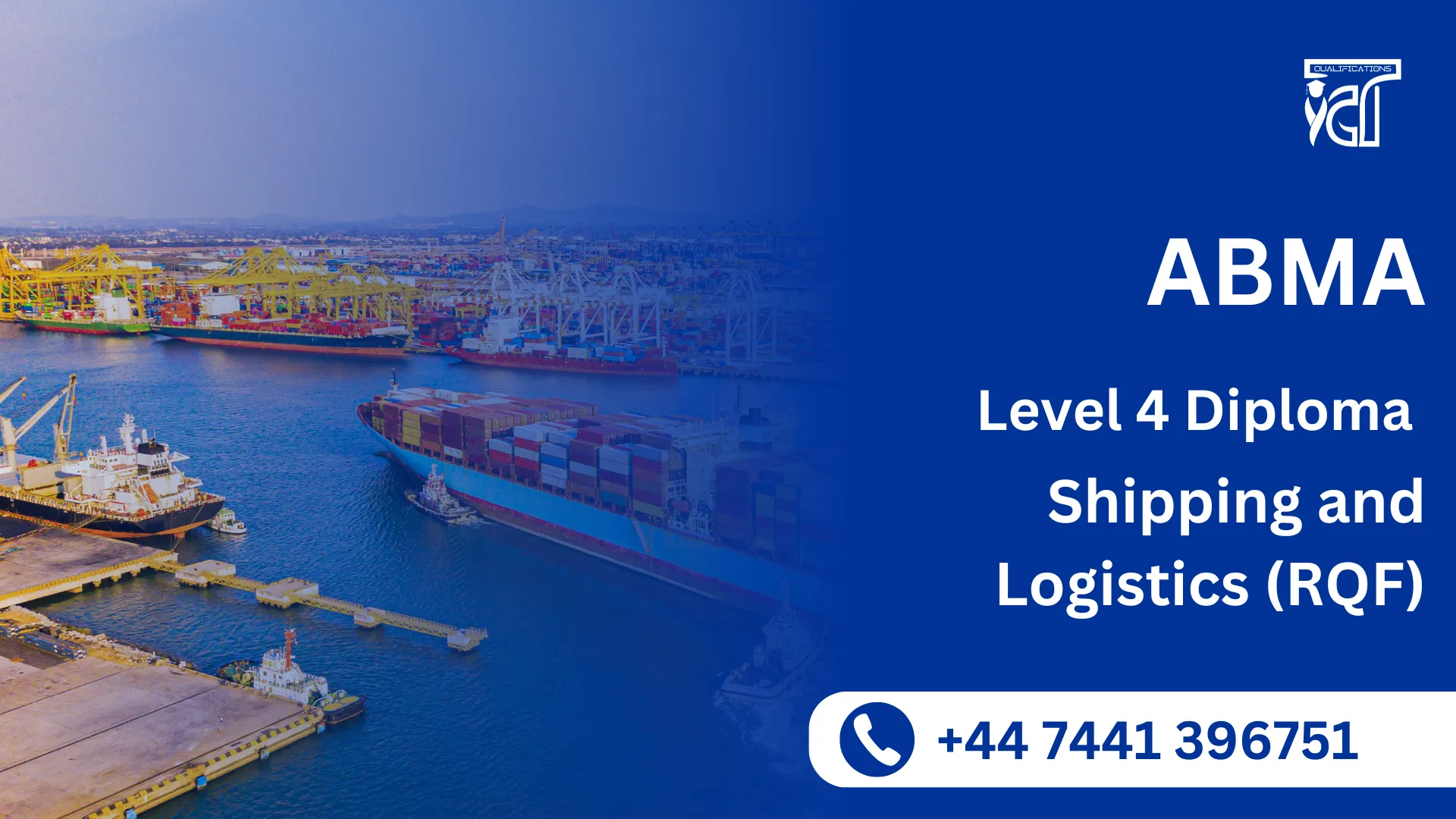In today’s fast-paced, interconnected world, shipping and logistics play a crucial role in keeping economies functioning. From moving goods across borders to ensuring that supply chains run smoothly, professionals in the shipping and logistics industry are in high demand. If you’re looking to develop a strong foundation in these vital sectors and advance your career, the ABMA Level 4 Diploma in Shipping and Logistics (RQF) is the perfect qualification for you.
This Ofqual-regulated qualification offers a comprehensive curriculum designed to equip you with the skills and knowledge required to excel in the shipping and logistics industry. What makes this qualification even more appealing is its assignment-based assessment method, which provides a practical learning experience that you can immediately apply to real-world scenarios.
The ABMA Level 4 Diploma in Shipping and Logistics (RQF) is designed for individuals seeking a comprehensive understanding of the shipping and logistics sectors, whether you’re just starting out or aiming to advance your career. This qualification covers a range of essential topics, including supply chain management, transportation, port operations, and international trade, ensuring that you are well-prepared to meet the challenges and demands of the global logistics industry.
The ABMA Level 4 Diploma in Shipping and Logistics (RQF) is the ideal qualification for those seeking a career in the dynamic and essential field of logistics and shipping. With Ofqual-regulated status, assignment-based learning, and comprehensive industry coverage, this diploma equips students with the knowledge and skills required to succeed in global logistics operations. Whether you’re starting your career or advancing to managerial positions, this course offers a solid foundation for long-term success in the shipping and logistics sector.
ABMA Level 4 Diploma in Shipping and Logistics (RQF)
The ABMA Level 4 Diploma in Shipping and Logistics (RQF), qualification consists of all mandatory units of 125 credits, Total Qualification Time: 1250, and Total Guided Learning Hours: 650 for the completed qualification.
| Sr# | Unit Title | TQT | GLH | Credit |
|---|---|---|---|---|
| 1 | Introduction to Shipping Practice | 250 | 130 | 25 |
| 2 | Introduction to International Maritime Logistics | 250 | 130 | 25 |
| 3 | Introduction to Shipping Insurance and Salvage | 250 | 130 | 25 |
| 4 | Movement of Dangerous Goods | 250 | 130 | 25 |
| 5 | Overseas Trade Law | 250 | 130 | 25 |
| 6 | Environmental Issues | 250 | 130 | 25 |
| 7 | Port Operations | 250 | 130 | 25 |
GLH (Guided Learning Hours) and TQT (Total Qualification Time) are terms commonly used in vocational qualifications to help define the amount of time a learner is expected to spend on their studies.
1. GLH (Guided Learning Hours)
GLH refers to the number of hours a learner spends being directly taught, supervised, or supported during their course. This includes the time spent in activities such as:
- Classroom instruction
- Practical workshops
- One-on-one tutoring or mentoring sessions
- Online learning sessions with tutor support
In other words, GLH represents the time that learners are actively engaged with their instructors or learning activities.
2. TQT (Total Qualification Time)
TQT represents the total amount of time a learner is expected to invest in completing a qualification, including:
- GLH (Guided Learning Hours): Time spent on direct learning, as explained above.
- Self-Directed Learning: This includes time spent on independent study, research, assignment completion, preparation for exams, and any other work the learner does outside of direct teaching hours.
TQT is a broader measure that includes all the time required to achieve the qualification. It helps learners and employers understand the overall commitment required for the qualification.
Key Differences Between GLH and TQT:
- GLH focuses on direct learning with guidance or supervision.
- TQT includes GLH as well as independent study time and other learning-related activities.
Example:
If a qualification has a TQT of 600 hours and a GLH of 250 hours, it means the learner should spend 250 hours in direct learning (classroom, online, or tutor-led sessions) and 350 hours on independent study or research.
Learning Outcomes for the ABMA Level 4 Diploma in Shipping and Logistics (RQF)
Upon successful completion of the ABMA Level 4 Diploma in Shipping and Logistics (RQF), learners will be able to demonstrate the following learning outcomes based on the study units:
Unit 1: Introduction to Shipping Practice
- Understand the core principles of the shipping industry, including the key players, processes, and operations involved in shipping.
- Identify various types of shipping operations, such as bulk carriers, container ships, and tankers, and their roles in global trade.
- Analyze the responsibilities of shipping companies and the regulatory frameworks that govern shipping practices.
- Evaluate key factors influencing shipping operations, such as logistics coordination, cost control, and time management.
Unit 2: Introduction to International Maritime Logistics
- Demonstrate knowledge of international maritime logistics, including the movement of goods across different countries and ports.
- Understand the significance of ports, terminals, and their infrastructure in facilitating global maritime trade.
- Identify the logistical challenges in international shipping and how to address them effectively, including managing shipping routes, cargo handling, and documentation.
- Apply principles of maritime logistics in real-world scenarios to ensure efficient transportation and delivery of goods.
Unit 3: Introduction to Shipping Insurance and Salvage
- Understand the importance of shipping insurance in protecting against risks during transportation and the principles behind various types of shipping insurance.
- Identify common risks in shipping, such as damage to cargo, piracy, and accidents, and explore the different forms of insurance used in maritime trade.
- Explain the process of shipping salvage and its role in mitigating financial loss during maritime accidents or incidents.
- Evaluate the legal and financial aspects of shipping insurance and salvage in protecting the interests of shipping companies, cargo owners, and insurers.
Unit 4: Movement of Dangerous Goods
- Understand the regulatory frameworks governing the transport of dangerous goods, including international guidelines such as the IMDG (International Maritime Dangerous Goods) Code.
- Identify the types of dangerous goods and the risks associated with their transportation by sea.
- Evaluate the procedures and safety measures involved in the handling and shipment of dangerous goods to ensure compliance and safety.
- Apply safety protocols to manage the transportation of hazardous materials, including packaging, labeling, and emergency response actions.
Unit 5: Overseas Trade Law
- Understand the principles of overseas trade law and its impact on international shipping operations.
- Identify key international trade agreements, conventions, and regulations that govern shipping and logistics operations.
- Analyze the legal requirements for exporting and importing goods across borders, including customs regulations, tariffs, and trade restrictions.
- Apply trade law principles to real-world shipping and logistics scenarios, ensuring compliance with international legal standards.
Unit 6: Environmental Issues
- Understand the environmental challenges facing the shipping and logistics industries, including pollution, carbon emissions, and waste management.
- Identify international environmental regulations such as MARPOL (International Convention for the Prevention of Pollution from Ships) and their impact on shipping practices.
- Evaluate the environmental impact of shipping operations and the need for sustainable practices, such as eco-friendly vessels, energy-efficient technologies, and waste reduction.
- Develop strategies for reducing environmental risks and promoting sustainability within the shipping and logistics sectors.
Unit 7: Port Operations
- Understand the role of ports in the global shipping and logistics network, including port infrastructure, facilities, and operations.
- Analyze the logistics involved in port operations, such as cargo handling, storage, containerization, and scheduling of vessel arrivals and departures.
- Identify key challenges and solutions in managing port operations, including congestion, security, and operational efficiency.
- Evaluate how port operations can be improved through the use of technology, automation, and sustainable practices to enhance efficiency and reduce costs.
Benefits of the ABMA Level 4 Diploma in Shipping and Logistics (RQF)
The ABMA Level 4 Diploma in Shipping and Logistics (RQF) is a highly valuable qualification for anyone seeking to build a career in the global shipping, logistics, and supply chain management sectors. Below are the key benefits of pursuing this course:
1. Ofqual Regulated Qualification
As an Ofqual-regulated qualification, the ABMA Level 4 Diploma is recognized and accredited by the UK government, ensuring that the qualification meets high academic standards. This recognition makes it internationally accepted, adding value to your resume and enhancing your career prospects globally.
2. Comprehensive Industry Knowledge
This diploma covers a wide range of critical topics such as international maritime logistics, shipping insurance, environmental issues, and port operations. The course equips you with both theoretical knowledge and practical skills that are highly relevant to the global shipping and logistics industries, making you well-prepared for various roles in these sectors.
3. Assignment-Based Learning
The assignment-based assessment method means you can apply your knowledge directly to real-world scenarios, which helps you better understand the challenges and practices in the industry. This hands-on learning approach enhances critical thinking and problem-solving skills, ensuring that you are not only learning theoretical concepts but also how to implement them effectively.
4. Boosted Employability
Employers in the shipping and logistics industries value individuals with a solid understanding of global trade, supply chain management, and shipping logistics. With this qualification, you’ll enhance your employability, gaining access to a wider range of job opportunities, including roles such as Logistics Coordinator, Shipping Manager, and Supply Chain Analyst.
5. Career Advancement
For those already working in the shipping or logistics industries, this diploma serves as an excellent stepping stone for career progression. The knowledge gained from the course will position you for more advanced roles, including Shipping Operations Manager, Port Manager, and other leadership positions within the industry.
6. International Recognition
Given the importance of shipping and logistics in the global economy, the ABMA Level 4 Diploma is accepted and respected across the world. Whether you’re working in Europe, Asia, the Americas, or anywhere else, this qualification will help you pursue career opportunities in international logistics, trade, and transportation.
7. Flexible Learning
The course’s assignment-based structure allows for flexible learning, enabling students to study at their own pace while still managing work and personal commitments. This flexibility is ideal for those looking to balance their professional and educational responsibilities without compromising on their career growth.
8. Practical Application of Knowledge
By engaging with real-world case studies and assignments, you’ll gain hands-on experience in international shipping operations, logistics management, and maritime regulations. This practical exposure will ensure that you are industry-ready and can hit the ground running once you complete the course.
9. Networking Opportunities
The ABMA Level 4 Diploma in Shipping and Logistics connects students to a network of professionals in the shipping, logistics, and supply chain industries. Through collaborations, peer interactions, and industry insights, you will have opportunities to network, which can be valuable in advancing your career.
10. Pathway for Further Education
For those wishing to pursue further qualifications, this diploma serves as a solid foundation for advanced studies. You can progress to a Level 5 Diploma or even a Bachelor’s degree in Logistics, Supply Chain Management, or International Trade. This pathway opens doors to specialized roles and leadership positions in the field.
Best Fit for the ABMA Level 4 Diploma in Shipping and Logistics (RQF)
The ABMA Level 4 Diploma in Shipping and Logistics (RQF) is ideal for individuals who are seeking to build or advance their careers in the global shipping, logistics, and supply chain industries. This course is best suited for the following:
1. Aspiring Shipping and Logistics Professionals
If you’re looking to break into the shipping and logistics sector, this diploma offers a strong foundation in the key concepts and operations of the industry. It is perfect for individuals who want to start their careers as Shipping Coordinators, Logistics Assistants, or Operations Executives.
2. Professionals Seeking Career Advancement
For those already working in logistics, transportation, or shipping roles, this qualification provides a valuable opportunity to develop new skills and knowledge that can help with career progression. It is ideal for individuals looking to move into more senior positions such as Logistics Managers, Shipping Managers, or Supply Chain Analysts.
3. Individuals with an Interest in International Trade
If you have an interest in global trade, cross-border logistics, and international shipping, this course provides the knowledge you need to navigate these areas. It’s suitable for individuals seeking to work in international trade, freight forwarding, or global logistics operations.
4. Those Looking to Specialize in Maritime Logistics
For individuals specifically interested in maritime operations, port management, or shipping logistics, the course offers in-depth knowledge about international shipping practice, port operations, and shipping insurance. It’s ideal for those who want to pursue specialized careers in maritime logistics or port operations.
5. Entrepreneurs in Shipping and Logistics
If you’re an entrepreneur or aspiring business owner in the shipping, logistics, or transportation sector, this qualification will equip you with the business and operational skills needed to effectively manage shipping and logistics companies, from understanding trade laws to managing shipping operations.
6. Those Seeking a Flexible Learning Path
The assignment-based structure of the course is perfect for individuals looking for a flexible, self-paced learning approach. Whether you are a working professional or a student with other commitments, this course allows you to learn and apply your knowledge without having to attend traditional classroom settings.
7. Professionals Looking to Work in Regulatory and Compliance Roles
For those interested in compliance and regulatory roles within shipping and logistics, the course will help you gain a solid understanding of shipping insurance, trade law, environmental regulations, and dangerous goods transportation—skills critical for roles in compliance, regulatory affairs, or safety management within the shipping industry.
8. Individuals Pursuing Global Careers
The global recognition of this qualification makes it an excellent fit for individuals looking to work internationally. Whether you’re interested in working with global shipping companies, international freight forwarders, or multinational corporations, this diploma prepares you for a career anywhere in the world.
9. Those Interested in Sustainability in Shipping
If you have a passion for environmental sustainability and want to make a positive impact on the shipping and logistics industry, this course addresses critical topics such as environmental issues and sustainable shipping practices, helping you to contribute to greener operations within the industry.
Entry Requirements
Register Now
Qualification Process
Qualification Process for the ABMA Level 4 Diploma in Shipping and Logistics (RQF)
- Self-Assessment:
Begin by evaluating your eligibility to ensure you meet the qualification requirements, including work experience, knowledge, and language proficiency. - Registration:
Complete your registration by submitting the required documents, including a scanned copy of a valid ID, and paying the registration fee. - Induction:
An assessor will conduct an induction to confirm your eligibility for the course and explain the evidence requirements. If you do not meet the criteria, your registration will be canceled, and the fee will be refunded. - Assignmnets & Evidence Submission:
Provide all assignmnets and the necessary evidence based on the assessment criteria outlined in the course. If you are unsure of the required evidence, consult with the assessor for guidance on the type and nature of evidence needed. - Feedback and Revision:
The assessor will review your submitted evidence and provide feedback. Evidence that meets the criteria will be marked as “Criteria Met,” while any gaps will be identified. You will be asked to revise and resubmit if needed. - Competence Evidence:
Submit final evidence demonstrating that all learning outcomes have been met. This evidence will be marked as “Criteria Met” by the assessor once it is satisfactory. - Internal Quality Assurance (IQA):
The Internal Quality Assurance Verifier (IQA) will review your evidence to ensure consistency, quality, and compliance with standards. - External Verification:
The IQA will submit your portfolio to ABMA External Quality Assurance Verifiers (EQA) for final confirmation. The EQA may contact you directly to verify the authenticity of your evidence. - Certification:
Upon successful completion of all checks, ABMA will issue your official certificate, confirming that you have attained the ABMA Level 4 Diploma in Shipping and Logistics (RQF).







